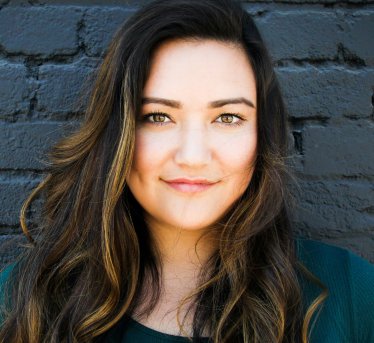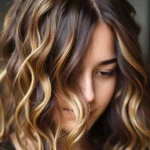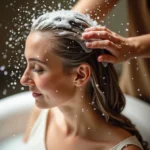In the quest for luscious, healthy hair, it’s easy to get lost amid the plethora of products and tips available. From shampooing techniques to dietary advice, the sheer volume of information can be overwhelming. So, what are the opinions of the experts? Dermatologists offer priceless guidance for maintaining and enhancing hair health due to their thorough understanding of the biology of skin and hair health.
Whether you’re dealing with dryness or breakage or want to keep your locks looking their best, this guide distills the most effective strategies and expert recommendations. Let’s explore what the dermatologists advise to ensure your hair not only looks great but feels great, too.
1. Establish a Consistent Haircare Routine
One of the foundational steps to achieving and maintaining hair health is establishing a consistent haircare routine. A routine helps your hair adapt to care products, making them more effective over time. Here are key components to consider:
Shampooing
Choose a shampoo that suits your hair type. If you have oily hair, opt for a clarifying shampoo; if you have dry hair, look for moisturizing ingredients like argan oil or shea butter. It’s crucial to avoid overwashing, as it can strip your hair of its natural oils.
Conditioning
Conditioning is essential to keep your hair moisturized. Focus on the ends of your hair, where it’s often the driest. For added moisture, consider a deep conditioner or hair mask once a week.
Detangling
Always detangle your hair gently using a wide-tooth comb or a detangling brush. Start from the end and work your way up to avoid breakage.
Regular Trims
Regular trims—every 6–8 weeks—are crucial for preventing split ends and maintaining the health of your hair. Even if you’re growing your hair out, trimming the ends will help keep it looking fresh and healthy.
Avoiding Heat
Heat styling tools can cause significant damage to your hair’s health over time. If you must use them, always apply a heat protectant spray beforehand and use the lowest heat setting possible.
2. Eat a Nutrient-Dense Diet
What you eat plays a significant role in the health of your hair. Nutrients like vitamins, minerals, and proteins are vital for hair growth and strength.
Protein
Hair is primarily made of protein, so it’s essential to include enough protein in your diet. Foods like eggs, fish, and legumes are excellent sources of protein.
Vitamins
- Vitamin A: promotes the healthy production of sebum in the scalp. Found in carrots, spinach, and sweet potatoes.
- Vitamin C: is essential for collagen production, which strengthens hair. Found in citrus fruits, strawberries, and bell peppers.
- Vitamin E: improves blood circulation in the scalp. Found in nuts, seeds, and avocados.
Minerals
- Iron prevents hair loss. Found in red meat, spinach, and lentils.
- Zinc: Helps with hair tissue growth and repair. Found in oysters, beef, and pumpkin seeds.
Hydration
Drink plenty of water. Hydration starts from within, and keeping your body well-hydrated ensures that your hair receives the necessary moisture.
4. Use Oils on Your Hair
Using natural oils can provide your hair with essential nutrients and improve its overall health.
Coconut Oil
Rich in lauric acid, coconut oil moisturizes and protects the hair shaft. It’s great for deep conditioning and can be used as a pre-wash treatment.
Argan Oil
Often called “liquid gold,” argan oil is packed with vitamins, minerals, and antioxidants. It hydrates, reduces frizz, and adds a natural shine to your hair.
Jojoba Oil
Similar to the natural oil produced by your scalp, jojoba oil is excellent for moisturizing and balancing oil production. It can be used as a leave-in conditioner.
Olive Oil
Rich in vitamins A and E, olive oil strengthens the hair and makes it more manageable. It’s an excellent option for dry or damaged hair.
Application Tips
Apply oils to damp hair for better absorption. Use a small amount to avoid weighing down your hair, and focus on the mid-lengths and ends.
Related: Best Oil for Curly Hair
5. Take Care of Your Scalp
A healthy scalp is the foundation of hair health. Neglecting your scalp can lead to issues like dandruff, itchiness, and hair loss.
Cleanse Regularly
Use a gentle shampoo to cleanse your scalp and remove buildup. Avoid harsh shampoos that can strip your scalp of natural oils.
Exfoliate
Just like your skin, your scalp can benefit from exfoliation. Use a scalp scrub or a brush to remove dead skin cells and promote blood circulation.
Moisturize
If your scalp is dry, consider using a scalp serum or oil. Ingredients like tea tree oil and aloe vera can soothe and moisturize your scalp.
Massage
Scalp massages increase blood flow and stimulate hair follicles. Use your fingertips to massage your scalp for a few minutes every day.
Avoid Tight Hairstyles
Tight hairstyles can put stress on your scalp and hair follicles, leading to breakage and hair loss. Opt for looser styles to give your scalp a break.
6. Sleep on a Silk or Satin Pillowcase
Switching to a silk or satin pillowcase can significantly impact the health of your hair.
Reduced Friction
Silk and satin create less friction compared to cotton, reducing the risk of hair breakage and split ends.
Moisture Retention
These materials help retain the natural moisture in your hair, preventing dryness and frizz.
Fewer Tangles
The smooth texture of silk and satin reduces tangling, making your hair easier to manage in the morning.
Skin Benefits
Silk pillowcases are also beneficial for your skin, reducing the appearance of wrinkles and keeping your skin hydrated.
7. Stay on Top of Your Health
Your overall health significantly affects your hair health.
Regular Check-Ups
Regular medical check-ups can help identify any underlying health issues affecting your hair.
Manage Chronic Conditions
Conditions like thyroid disorders, anemia, and hormonal imbalances can impact hair health. Managing these conditions is crucial for healthy hair.
Mental Health
Stress and anxiety can lead to hair loss and other issues. Make mental health a priority through mindfulness, therapy, and relaxation techniques.
Exercise
Regular exercise improves blood circulation, including to your scalp, promoting hair growth.
8. Minimize Stress
Stress has a direct impact on hair health, often leading to hair loss and thinning.
Mindfulness and Meditation
Practicing mindfulness and meditation can help reduce stress levels. Even a few minutes a day can make a significant difference.
Exercise
Regular physical activity releases endorphins, which help reduce stress. Activities like yoga, jogging, and swimming are excellent options.
Hobbies
Engage in hobbies that you enjoy and that help you relax. Whether it’s reading, painting, or gardening, taking time for yourself can reduce stress.
Professional Help
If stress is overwhelming, consider seeking help from a mental health professional. Therapy can provide effective strategies for managing stress.
9. Try Keratin Treatments
Keratin treatments can be beneficial for strengthening and smoothing your hair.
What is Keratin?
Keratin is a protein that makes up the structure of your hair. Keratin treatments involve applying a keratin-infused product to your hair and sealing it with heat.
Benefits
- Strengthens Hair: Adds an extra layer of protection.
- Reduces Frizz: Smooths the hair cuticle for a sleek look.
- Improves Manageability: Makes hair easier to style and reduces drying time.
Considerations
While keratin treatments can be beneficial, they often contain formaldehyde, which can be harmful. Look for formaldehyde-free options and consult a professional before proceeding.
10. Protect Your Hair From the Sun
Just like your skin, your hair can suffer from sun damage.
Wear a Hat
A wide-brimmed hat offers excellent protection from the sun’s harmful UV rays.
Use UV-Protectant Sprays
There are hair products designed to protect your hair from UV damage. Look for sprays or leave-in conditioners with UV filters.
Hydration
Sun exposure can dry out your hair. Use hydrating shampoos and conditioners, and consider a deep conditioning treatment after a day in the sun.
Avoid Chlorine
Chlorine from swimming pools can damage your hair’s health. Rinse your hair before and after swimming to minimize exposure.
11. Exercise Regularly
Regular exercise benefits not only your body but also your hair health.
Improved Circulation
Exercise improves blood circulation, which means more oxygen and nutrients reach your hair follicles, promoting healthy hair growth.
Stress Reduction
Physical activity reduces stress, which can help prevent stress-related hair loss.
Detoxification
Sweating helps detoxify your body, removing impurities that could affect your hair’s health.
Maintenance
Ensure you wash your hair after intense workouts to remove sweat and prevent buildup.
12. Listen to Your Hair
Your hair can tell you a lot about what it needs if you pay attention.
Observe Changes
Notice any changes in texture, density, or appearance. These changes can indicate what your hair needs.
Adjust Routine
If your hair feels dry, incorporate more moisturizing products. If it’s oily, look into clarifying shampoos.
Seasonal Adjustments
Your hair needs can change with the seasons. Adjust your routine accordingly; for example, use more hydrating products in the winter.
Professional Advice
If you’re unsure about what your hair needs, consult a professional for personalized advice.
13. Be Gentle With Styling
How you style your hair can significantly impact its health.
Avoid Tight Hairstyles
Tight ponytails, braids, and buns can cause breakage and stress on your hair. Opt for looser hairstyles.
Use Gentle Tools
Use soft brushes and wide-tooth combs to detangle your hair. Avoid brushes with hard bristles that can cause breakage.
Limit Heat Styling
When possible, avoid using heat-styling tools. If you must, always use a heat protector and opt for the lowest heat setting.
Air Dry
Whenever possible, allow your hair to air dry instead of using a blow dryer. This reduces heat exposure and potential damage.
14. See a Dermatologist for a Customized Routine
For the best results, consider consulting a dermatologist for a haircare routine tailored to your needs.
Personalized Assessment
A dermatologist can assess your hair and scalp condition, providing insights that you may not be aware of.
Tailored Treatments
Based on your assessment, a dermatologist can recommend treatments and products specifically suited to your hair type and condition.
Address Underlying Issues
Sometimes, hair problems are a result of underlying health issues. A dermatologist can help identify and treat these issues.
Long-Term Care
A dermatologist can provide a long-term hair health plan, ensuring your hair remains healthy and strong over time.
Conclusion
Achieving and maintaining hair health requires a multifaceted approach, from a consistent haircare routine to a balanced diet and stress management. By following these expert tips, you’ll be well on your way to luscious, healthy locks.
Ready to take your hair health to the next level? Book a consultation with one of our dermatologists today to get a customized haircare routine tailored just for you!







1 thought on “15 Ways to Improve Overall Hair Health, According to Dermatologists”